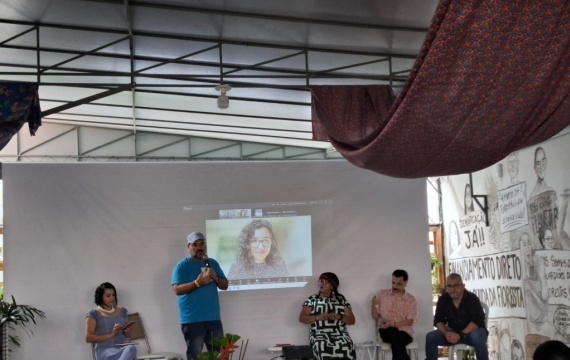FGV Researchers Discuss Strategies to Protect Territories at COP30
On Wednesday morning (12), the panel “COP30 in the Amazon: Pathways for Territory Protection and Climate Change Response”, held at the COP do Povo space, offered reflections on strategies to tackle extreme events and ensure climate resilience in traditional Amazonian territories, a region marked by historical pressures and growing threats.
Organized in partnership by the Independent Territorial Monitoring Network (Rede MTI), the Center for Sustainability Studies at Fundação Getulio Vargas (FGVces), the Indigenous Territorial Monitoring Management of the Coordination of Indigenous Organizations of the Amazon (GEMTI/COIAB), Agro é Fogo Initiative, and the Forests and Finance Coalition, the event gathered Indigenous leaders, civil society representatives, and researchers to share concrete lessons from addressing extreme drought, criminal fires, and deforestation that affected the Amazon between 2023 and 2024.
Panelists emphasized that effective measures to tackle these challenges must stem from dialogue and joint action among directly impacted peoples and communities, civil society organizations, and public authorities. This approach, which was a consensus among participants, is essential to ensure responses that meet local demands, overcome logistical barriers, and strengthen strategies developed within territories, expanding climate resilience capacity.
Among the solutions presented were independent territorial monitoring actions, Indigenous surveillance, community fire brigades for prevention and management, and popular health surveillance. These initiatives enable monitoring of territorial impacts and the use of information for political advocacy and territorial protection.
Researcher Kena Chaves, from FGVces, reinforced the importance of articulation among different actors:
"Through dialogue and joint action among peoples and communities, civil society organizations, universities, and public authorities, it will be possible to scale up and enhance the effectiveness of measures to address climate change impacts, aiming to prepare territories and strengthen local and regional capacities to face future extreme events and achieve climate justice. To this end, it is necessary to overcome historical vulnerabilities and inequalities, especially in access to resources and infrastructure, and guarantee rights."
Eric Macedo, also a researcher at FGVces, highlighted the need to ensure representation in decision-making spaces:
"Reflections point to the need to include representatives of Indigenous peoples, traditional communities, quilombolas, and family farmers in official COP30 political negotiation spaces, and to recognize the knowledge, plans, and strategies built locally through a territorial approach to address climate challenges. By ensuring social participation, recognition, and representation of these actors, it will be possible to advance toward more effective commitments to tackle the major and complex challenges of the climate agenda."
Macedo also stressed the role of research in ensuring these voices are considered in global decision-making processes:
"Ethical, democratic, and dialogical research has the potential to foster respectful encounters between traditional and scientific knowledge, promoting collective pathways to overcome climate change challenges and achieve climate justice, alongside the guarantee of epistemic justice."
Full coverage of Fundação Getulio Vargas’ participation in COP30, including agendas, exclusive content, and contributions from the institution’s researchers to global climate action, is available on the FGV Climate Agenda Platform. The opinions expressed in this publication are the sole responsibility of the contributing researchers and do not necessarily reflect the official position of Fundação Getulio Vargas.
